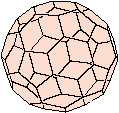Transmutation
In 1919, Ernest Rutherford (the man who discovered the nucleus) and his research group became the first people to cause
transmutation - the changing of one nucleus into another. While they didn't change lead into gold, they were the first to control a nuclear change instead of simply relying on nature. They shot a sample of the isotope Nitrogen-14 with a beam of alpha particles as shown below:
|
|
|
|
|
|
|
|
|
|
|
| 14 |
|
|
4 |
|
|
17 |
|
|
1 |
|
|
N |
+ |
|
He |
→ |
|
O |
+ |
|
H |
| 7 |
|
|
2 |
|
|
8 |
|
|
1 |
|
|
If you look carefully, you'll note that they actually caused transmutation in
two elements: Nitrogen-14 became Oxygen-17, and Helium-4 (the alpha particle) became Hydrogen-1. Over the years, scientists have smashed different elements together to create a large number of different isotopes, many of which do not exist in nature.
Neutrons also can be used to cause transmutation, as we'll see next.

